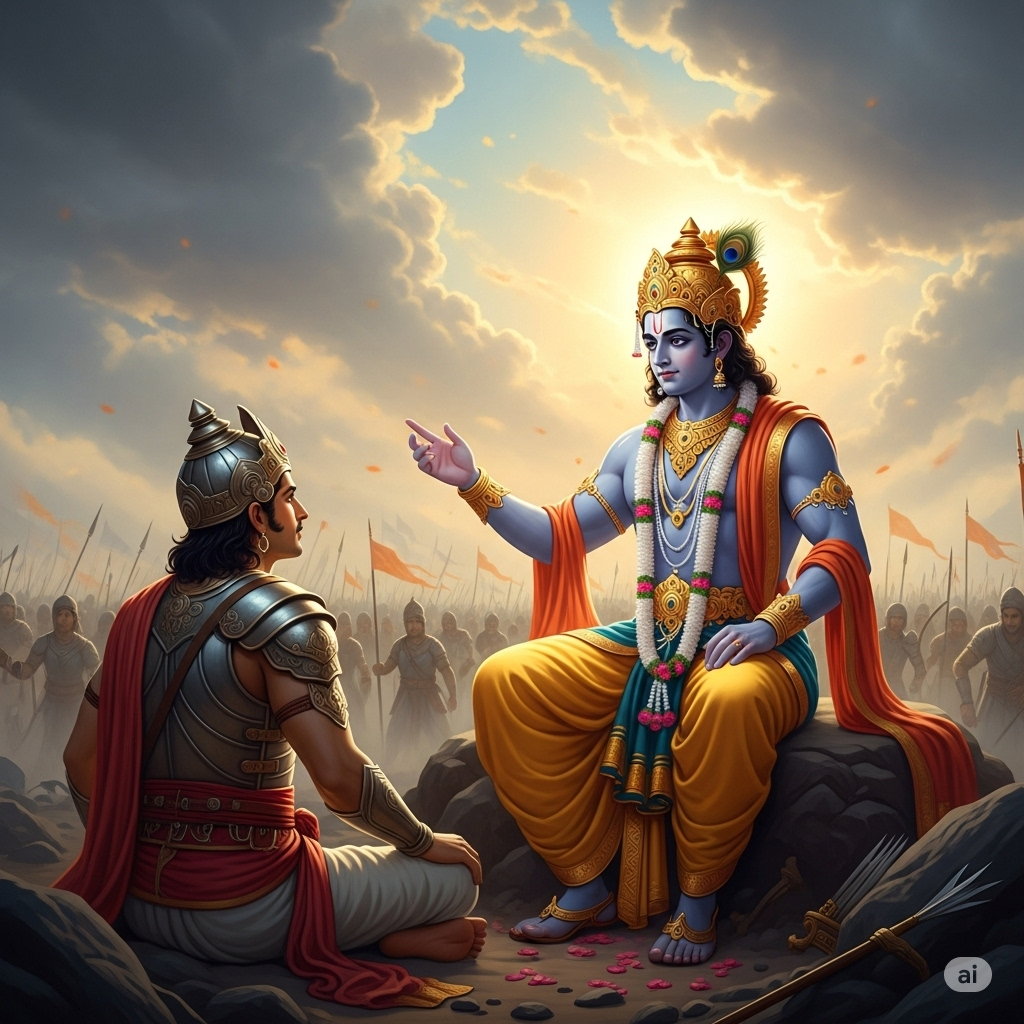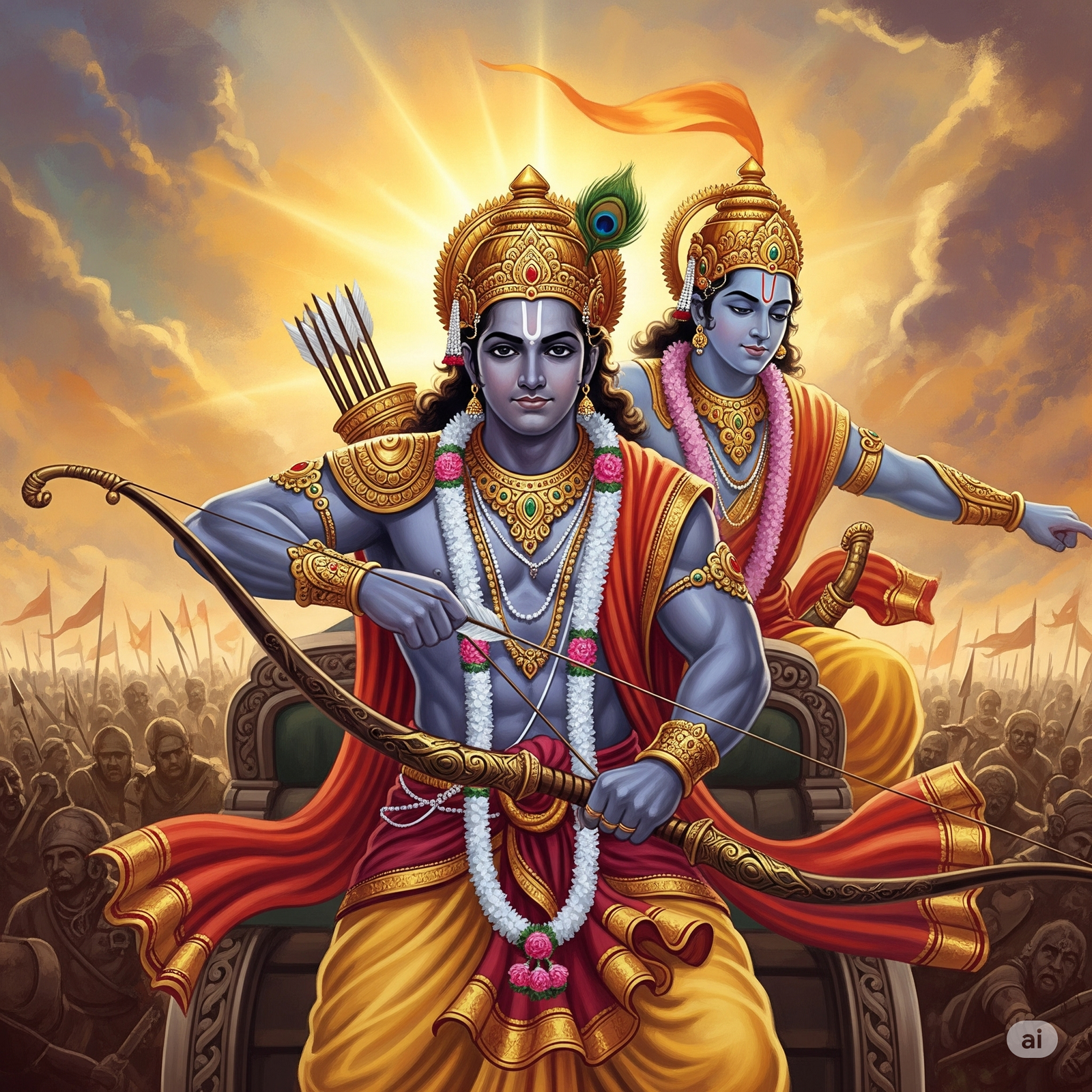Who is the real hero of Mahabharat?
The Mahabharat is more than just a tale of two warring families. It’s a spiritual, philosophical, and emotional epic that digs deep into human nature, the clash between dharma (duty) and adharma (injustice), and the essence of what it means to be heroic. Throughout the Mahabharat, we meet numerous characters—gods, kings, warriors, women of strength—each contributing uniquely to the narrative. But the question that continues to ignite debates even today is, who is the real hero of Mahabharata?
📘 Mahabharat Characters List – Names, Roles & Descriptions
| Character Name | Role in Mahabharat | Short Description |
|---|---|---|
| Krishna | Divine Strategist, Charioteer of Arjuna | Incarnation of Lord Vishnu, central guide in the war. |
| Arjuna | Pandava Prince, Warrior | Expert archer, key hero in the battle of Kurukshetra. |
| Karna | Warrior of Kauravas, Son of Surya | The vow-bound warrior fought for the Kauravas despite loving the Pandavas. |
| Bhishma | The central female character is a symbol of dignity and strength. | The strongest of the Pandavas killed Duryodhana. |
| Yudhishthira | Eldest Pandava, King | Known for his truthfulness and righteousness. |
| Duryodhana | Eldest Kaurava, Antagonist | Arrogant and jealous; instigated the war. |
| Draupadi | Wife of Pandavas | Took a blindfold for life, a symbol of sacrifice. |
| Dronacharya | Guru of Pandavas & Kauravas | Master of warfare and strategy, fought for Kauravas. |
| Bhima | Pandava Brother | Took a blindfold for life, a symbol of sacrifice. |
| Nakula | Twin Pandava Brother | Skilled in swordsmanship and horse-keeping. |
| Sahadeva | Twin Pandava Brother | Known for wisdom and astrology. |
| Shakuni | Maternal Uncle of Kauravas | Master manipulator behind the dice game. |
| Abhimanyu | Son of Arjuna | Brave young warrior, killed in Chakravyuha. |
| Gandhari | Mother of Kauravas | Took a blindfold for life, a symbol of sacrifice. |
| Kunti | Devoted mother, secretly the mother of Karna. | The immortal warrior committed war crimes. |
| Ashwatthama | Son of Dronacharya | Known for his wisdom, he supported the Pandavas. |
| Vidura | Wise Advisor to the Kuru dynasty | The vow-bound warrior fought for the Kauravas despite loving the Pandavas. |
| Dhritarashtra | Blind King of Hastinapur | Father of the Kauravas, often misled by others. |
| Sanjaya | Narrator to Dhritarashtra | Divine vision to narrate the war events. |
| Ekalavya | Self-taught Archer | Disciple of Drona, made a great sacrifice. |
Understanding Heroism in the Context of Mahabharat
Who Is the Real Hero of Mahabharat?
Before naming the real hero, we must first understand what constitutes a hero in the Mahabharat. Unlike modern superheroes defined by brute strength or high-tech gadgets, a Mahabharat hero is multi-dimensional.
Defining Dharma and Kshatriya Code
Heroes in the Mahabharat are often judged by how closely they follow dharma, or righteousness. The Kshatriya code of conduct—courage, honour, sacrifice, and justice—was central to a warrior’s identity. But dharma is not black-and-white in the epic; it’s often conflicting, leading characters to make painful choices. This grey area makes determining even more nuanced.
Arjuna—The Hero with Divine Wisdom
Arjuna is often the first name that comes to mind when people think about Mahabharat. As the most skilled warrior among the Pandavas and the favourite of Lord Krishna, Arjuna stands as a symbol of courage and intellect.
Real Hero of Mahabharat Gita

Karna—The Tragic Warrior of Loyalty and Sacrifice
Karna’s story is one of the most emotionally gripping parts of the Mahabharat. Born to Kunti and the Sun God but abandoned at birth, Karna grows up as a charioteer’s son, facing rejection and insult despite his divine heritage.
The Epitome of Loyalty and Valor
Karna’s unwavering loyalty to Duryodhana, even when he knows he’s on the wrong side, is what makes him a unique hero. He never asks for sympathy; instead, he earns respect through hard work, generosity, and battlefield prowess. Karna’s life is a reflection of how society often overlooks greatness due to birth and status. Many view Karna as the real hero of Mahabharat because of his noble spirit and tragic destiny.

Krishna—The Divine Strategist and Moral Guide
Krishna plays the role of philosopher, charioteer, and tactician. He doesn’t pick up arms but influences the war’s outcome more than any warrior could.
Wisdom Over Weapons
Krishna’s advice to Arjuna in the Bhagavad Gita becomes the epic’s moral backbone. He teaches detachment, purpose, and the importance of selfless action. He also uses clever strategies to ensure the triumph of dharma, even if it means breaking traditional rules. Krishna’s divine intellect makes him a spiritual contender for the real hero of Mahabharat title.
Yudhishthira—The Righteous King Torn Between Morality and Duty
Yudhishthira is the eldest Pandava and the flagbearer of dharma. Known for his calm demeanour and truthfulness, he is a king who constantly evaluates the moral implications of his actions.
The Burden of Dharma
While his blind faith in rules leads to the infamous dice game loss, his remorse and redemption arc add depth to his character. Yudhishthira doesn’t desire power for its own sake; he wants to rule for the people. His commitment to righteousness, even in adversity, makes him a quiet but worthy candidate as the real hero of Mahabharat.
Draupadi—The Flame of Feminine Power and Justice
Draupadi is often viewed as the emotional spark of the Kurukshetra war. Her insult in the royal court is one of the most powerful scenes in the epic.
Strength in Suffering
Draupadi is more than a queen or wife—she is a woman who stood up against humiliation, injustice, and gender inequality. She demands accountability from the greatest of men and questions dharma where it fails her. In doing so, Draupadi becomes a symbol of resilience and courage. For many, her resistance makes her the real hero of Mahabharat, especially from a feminist lens.
Bhishma—The Warrior Who Sacrificed Everything
Bhishma, the grand patriarch, is a man of vows. His renunciation of kingship and celibacy for the sake of his father’s happiness defines the word sacrifice.
Bound by Duty, Not Emotion
Even though Bhishma fights for the Kauravas, his loyalty is to the throne, not to evil. His character is complex—he knows he’s on the wrong side but sticks to his vows. He lies on a bed of arrows until he chooses to die. His painful journey of dharma above all emotions positions him as a silent contender for the real hero of Mahabharat.
Abhimanyu—The Young Symbol of Bravery
Son of Arjuna, Abhimanyu is a symbol of youth, valour, and sacrifice. He breaks into the deadly Chakravyuha formation, fully aware he might not return.
A Glorious Yet Unjust End
Though young and inexperienced, Abhimanyu faces seasoned warriors alone. His unjust death is a turning point in the war. His bravery at such a young age leaves a lasting impact and raises the question: can a moment of unmatched valour qualify someone as the real hero of Mahabharat?
Dronacharya—The Teacher Torn by Loyalty
Dronacharya trained both the Pandavas and Kauravas. Though he is a guru, he makes morally ambiguous decisions.
Teacher or Warrior?
He remains loyal to Hastinapura’s throne but sacrifices his ethics. His partiality to Arjuna and his anger toward Drupada are questionable. Yet, he remains a complex figure symbolising how knowledge and dharma can conflict. Some may argue that his internal struggles reflect the human side of heroism, positioning him within the conversation about the real hero of Mahabharat.
The Many Faces of Heroism in Mahabharat
There isn’t one way to define heroism. The Mahabharat presents different dimensions—some visible, others spiritual.
Heroism Is Contextual
Heroism in the epic is not reserved for those who win wars or kill demons. It’s about sacrifice, truth, resilience, and growth. The beauty of Mahabharat is that it doesn’t glorify one character over another—it gives each their moment to shine. That’s why the real hero of Mahabharat may vary depending on who you are, what you value, and how you interpret the story.
Why This Question Still Matters Today
In today’s world of quick judgements and viral narratives, the nuanced nature of Mahabharat’s heroes offers a refreshing perspective.
Relatable, Timeless, and Real
Whether you’re a leader like Yudhishthira, a misunderstood warrior like Karna, a questioner like Draupadi, or a spiritual seeker like Arjuna, the epic gives you a character to reflect upon. The real hero of Mahabharat could be within each of us—flawed, trying, growing, and seeking the right path.
Conclusion
So, who is the real hero of Mahabharat? Is it Arjuna, guided by Krishna’s wisdom? Is it Karna, the outcast with a golden heart? Is it Draupadi, the voice of justice? Or Krishna himself, who orchestrates dharma’s triumph?
The answer may not lie in choosing one but in understanding all. Each character offers a piece of the puzzle. Together, they create a mosaic of values that continues to inspire generations. The Mahabharat doesn’t present a single hero—it reveals the heroism in us all.
FAQs
1. Why is Karna considered the tragic hero of Mahabharat?
Karna’s loyalty, sacrifice, and struggle against social injustice make him a deeply tragic yet noble figure.
2. Was Krishna a warrior or a guide?
Krishna never wielded a weapon but shaped the war’s outcome through wisdom, guidance, and strategy.
3. What makes Arjuna a central hero?
Arjuna’s transformation through the Bhagavad Gita and his dedication to dharma elevate his status as a spiritual hero.
4. How did Draupadi influence the war?
Her public humiliation became the emotional and moral catalyst for the Kurukshetra war.
5. Can there be more than one hero in Mahabharat?
Absolutely. The epic offers multiple heroes, each reflecting different virtues and lessons.